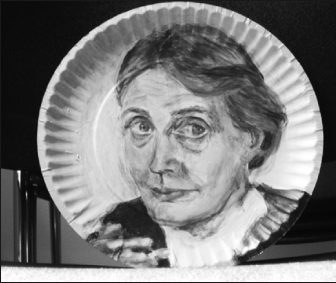By Kelly Kingman
Ilana Simons’ relationship to her greatest muse, Virginia Woolf, began inauspiciously. “I was assigned ‘To the Lighthouse’ in college and I hated it,” says Ilana Simons, a painter and literature professor in her early thirties. It’s clear the story has changed since then. I’m sitting with Simons among her portraits of famous artists, authors and philosophers in the Lower East Side Girls’ Club gallery space and a large canvas of Woolf dominates the room. And Simons’ book, “A Life of One’s Own: A Guide to Better Living through the Work and Wisdom of Virginia Woolf,” was just published by Penguin. “My feeling was ‘oh we’ve reached the token feminist for the semester.’ Like Woolf, I care a lot about the feminine, but I get turned off by the word ‘feminism’ because this seems to divide the world into two antagonistic categories. I had to trip across her on my own. I think you’ve got to read her in bed with a bottle of wine — utterly digging into privacy, a room of your own — to feel ownership and love of her.”
Simons explains that Woolf understood that our relationship to the greats could be intimidating. “In order to contribute to that conversation you need to accept your peculiar ‘brushstroke,’” says Simons, which in her case has turned out to be quite literal. The L.E.S. Girls Club exhibit is only the second showing of her paintings, a private hobby until now. During her first year in New York, Simons, who now lives in Hamilon Heights, ran a part-time business painting portraits on cakes with food coloring but eventually switched to paper plates as her substrate. “I painted on cakes because I wanted to sell portraits, but I never took the time to learn the complex chemistry of baking. Result: drippy flopped cakes,” she recalls with a smirk. “When I put Marx and Darwin on a paper plate it is a feminist statement.” It seems to echo the domesticity that Woolf must have been burdened with. “Virginia didn’t go to college like her brothers did, she spent all day scribbling in her third-floor bedroom, carving out her own relationship to books,” says Simons. “She hated the idea that you needed to be a highbrow college graduate to get the Big Ideas.”
Simons’ lifelong fascination with the big thinkers has led her on a winding path through academia. “I started off thinking I was going to be a philosopher, but eventually I realized I wasn’t really interested in some abstract truth but how my ego forces me to act in certain ways.” At the end of her doctoral program she decided she was not headed for literary criticism, either. “I was at a party after recently graduating with my Ph.D. and was talking to a fellow student about how we’d love to turn everything we just learned into something marketable. There are so many things I love about what Virginia Woolf had to say, and I wanted to write this non-academic book about that.” The portraiture has added another facet to her career. “My first show of the plates, earlier this summer, was exciting because some faces in the show ended up with their own. Joyce Carol Oates’ friend bought her plate for Joyce for her birthday. I’ve been commissioning some faces — doing people’s favorite writers or friends.” She hopes to do more commissions and expand her repertoire of authors.
Simons also shares Woolf’s fascination with people’s motivations and interactions, so much so that she is currently pursuing a master’s degree in clinical psychology. “The thing Woolf does best is in a scene you’ll really get the emotions that are operating. That’s why her books are delicious for me.” With a Ph.D. in literature from New York University, the Miami native has spent a great deal of time with the likes of Nietzsche, Marx and Hegel. A section in her book describes a walk she took in the woods, getting lost in the words of Plato. The paintings are a way to get to know the greats she reads and teaches. “Painting their faces is like a conversation, it’s intimacy for me, it gives me a sense of creative possibility in the relationship with this otherwise unavailable thinker. It reminds me to allow my own perspective into my reading of some author.”
Her book, part memoir, part self-help and a touch of thesis, includes lessons from Woolf that Simons has applied to her own life. “For me she’s all about ego — we’re all built in with this ego muscle that makes us feel more right than other people,” says Simons. “There are so many times when you, in your relationship with someone, think this person is a total idiot. But you can practice ego control, doing this kind of masochistic exercise, just repeating to yourself they’re not an idiot. ” As for the feminist label, Simons hesitates. “I’m a psychologist-in-training. I want to learn how people, gender aside, can best listen to and learn from one another.”





































